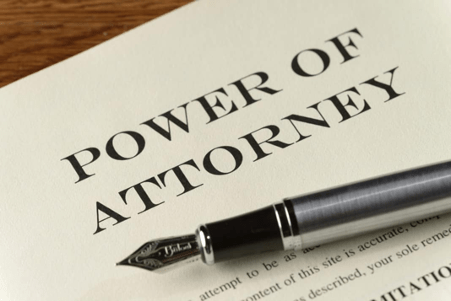Most civilians are not well-equipped with knowledge regarding property laws. However, it is imperative in this day and age to be prepared for emergencies. You never know when disaster may strike, leaving you incapable of controlling important decisions regarding your finances, medical, or personal care. A power of attorney (POA) is one such document to help you give peace of mind and prepare for the worst.
Preparing a POA is an important decision and must be taken with utmost attention. Here we compiled some of the most frequently asked questions and queries that concern power of attorney.
What is a Power of Attorney?
Power of Attorney is a legal document that gives a person (usually someone you trust) called an agent or attorney the legal ability to represent you to others or make decisions on your behalf.
This leads to the question “What is a springing power of attorney?” This is the act of transferring the power to make financial or medical decisions on your behalf to a person that you nominate to be your attorney. These decisions may refer to specific acts or generalised authority of your finances.
When and Why Power of Attorney is Important
Though a will determines the fate of your wealth after your death, a power of attorney will help do so in your lifetime. This is especially important in the event of your incapacitation or disability. The attorney will make decisions as per your power of attorney document to carry out your wishes regarding your financial, medical, or personal decisions.
You can do it anytime you wish, but the earlier you do it in your adulthood, the better. The power of attorney gives you the autonomy to control your life even if you are unable to do so yourself.
What Power Does Your Attorney Have?
Firstly, you need to remember that transferring the power of attorney does not make you powerless. The document will be made as per your wishes; it only helps create a medium, i.e. your attorney to carry out your will. This gives them authority to do the following:
- Transfer securities
- Invest assets
- Payment of bills
- Sell specified real estate
- Make personal care decisions including hygiene, nutrition, shelter, and safety
An attorney cannot:
- Write or change the principal’s will
- Act contrary to their fiduciary duty even if it is in the principal’s best interests
- Act or make decisions after the principal’s death. To do so, they need to appeal to be administrator of the principal’s estate
- Transfer or change power of attorney
- Vote in public elections on your behalf
Candidates for Power of Attorney
Selecting your attorney is the most crucial part of this document. It is as important as planning for your retirement. Before you decide on the candidate to be your attorney, here are people who are ineligible:
- Someone who receives compensation for providing healthcare
- People who are compensated in exchange for social, training, residential or support services. This excludes the partner/spouse/relative of the principal.
The foremost factor to determine your candidate is trust. POA is a powerful document, and its legal power is often understated. The attorney holds considerable power, especially if you become unable to make your own decisions. Therefore, you must choose your attorney wisely, whether it is your spouse, partner, siblings, relative, or even friends. Keep these in mind when making your decision.
Appoint someone you trust
This is a given and has already been discussed. If you are unable to find a person who suits your criteria, a trust company may be a better alternative.
Choose someone capable of responsibility
POA is no easy task and requires making difficult decisions under stressful conditions. Choose someone who would be able to make wise decisions that you would have made or approved of under the same conditions.
They are legally able to be your attorney
Your attorney must be a legal adult according to your state or country. It is also ideal that they live near you or at least the same country to be able to reach you in times of emergency.
Consider two attorneys
One for property and another for personal care. Ensure they get along. Though it can be a bit troublesome, the extra pair of eyes can reduce risk of misuse of POA. However, too many cooks spoil the broth, and it is possible to appoint too many attorneys.
Types of Power of Attorney
Powers of attorney are generally two types; property and personal. There are also those related to healthcare, finances, and those limited by time, which means they become invalid if you become incapacitated. In other words, POA is a document crafted as per your plans.
What Should Be Present in the Document
Your document called the POA form should be detailed and precisely mention the power/duties that your attorney has control of. There are many cookie cutter fill-in-the blank forms which should be generally avoided. Instead construct a form tailored to your needs. Here is the gist of what should be included in your document:
- When the document can be used such as in the event of your incapacity
- When and how the document becomes effective
- Whether the attorney is compensated for their work
- An alternate attorney if primary attorney is incapable or dead
- The power to make gifts of your money or other property
- The ability to change your community property agreement
- Whether they can select beneficiaries of your insurance policies
What To Discuss with Your Attorney
An open conversation with your attorney and clear communication so that they understand their role is vital. Tell them their responsibilities and give them a copy of the document.
You must discuss with them about your wishes in case you are incapacitated. This includes bank accounts, ownership papers, deeds, foreign property, whether you own property yourself or jointly, where you want to live, and how your medical expenses will be handled to ensure quality care. You are the primary benefactor of this document, not estate beneficiaries.
Furthermore, you need to specify that no decision will be made without your final say-so as long you are mentally sound. You will also want to show your attorney your will so that none of your testamentary gifts are sold if you are incapacitated unless funds are needed for your care. This will further help establish your authority and deter any malicious intent by the attorney or third parties.
Additionally, ask your attorney to keep records of all transactions for their legal safekeeping as they may be required to account for these transactions by other attorneys, dependents, or lawyers.
Finally, your attorney will also help take care of any dependents you have after caring for your financial responsibilities.
Can a Power of Attorney Be Cancelled?
Yes, this is known as revoking the POA. You can also amend it as you see fit and make any updates you wish to add. To do this, you need to send a signed written notice to the attorney or the Record of Deeds if your attorney is responsible for real estate dealings.
Must a Power of Attorney Be notarized or Recorded?
If you plan to allow your attorney to deal with your estates, the POA must be signed in front of a notary. It must also be recorded in the office of Recorder of Deeds. Even if land is not involved in the POA, it may be a wise decision to have your form notarized to ensure its validity in legal institutions.
Do I Need a Lawyer to Prepare a Power of Attorney?
Legally speaking, the presence of a lawyer isn’t necessary. However, it is wise to consult with one, especially when dealing with complicated forms to avoid repercussions in the future.
Witnesses for Power of Attorney
Like your will, POA will also be signed in the presence of at least two witnesses, depending on the state. They will also sign the documents as proof of their presence. The following are ineligible witnesses:
- A spouse, common-law partner, or child
- Your chosen attorney and/or their spouse or partner
- “Guardian of property” appointed personnel as ordained by a court as they are unable to manage their property due to medical reasons
- “Guardian of the person” appointed personnel ordained by a court because mentally they are unable to make personal care decisions
- Anyone under the age of majority in your province or territory
A great choice for witnesses are family friends or coworkers and can vouch that you signed the documents.
Power of Attorney Dies With You
POA is only applicable during your lifetime. Upon your death, your will goes into effect. Unless your attorney is not your will executor, they will no longer have any control over your assets.
Conclusion
Despite all preparations, the best advice is to be careful, both in terms of who you appoint as attorney and what power you give them. Abuses are unfortunately not uncommon even if the attorneys are spouses or family. Most importantly, read the document and communicate all terms and conditions with your attorney. It is always better to be safe than sorry.




